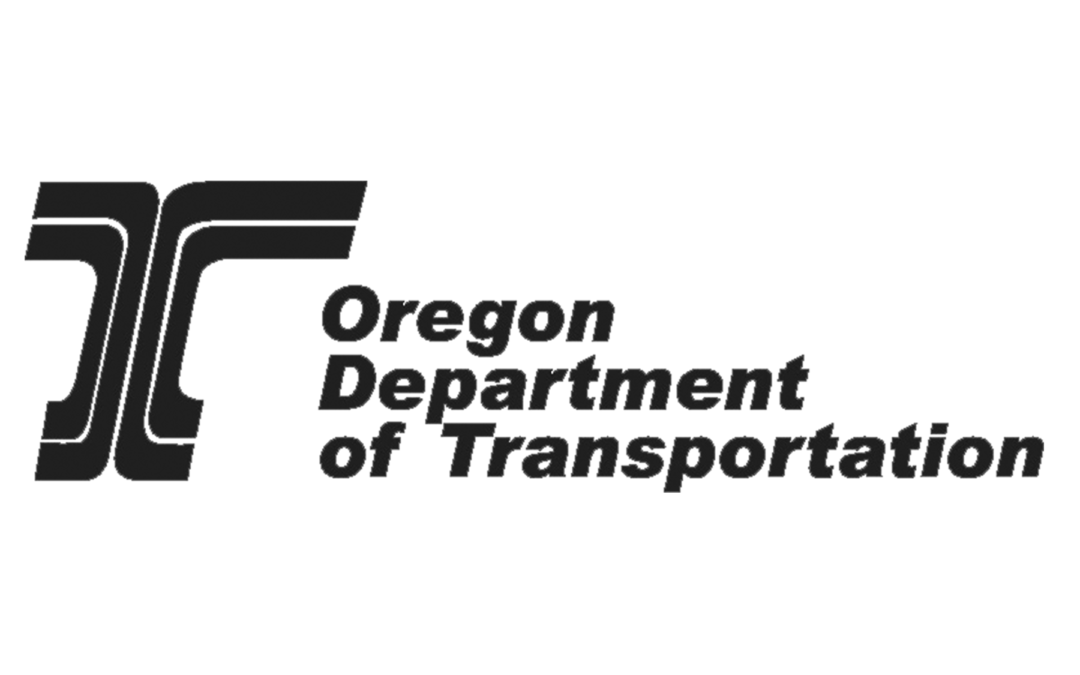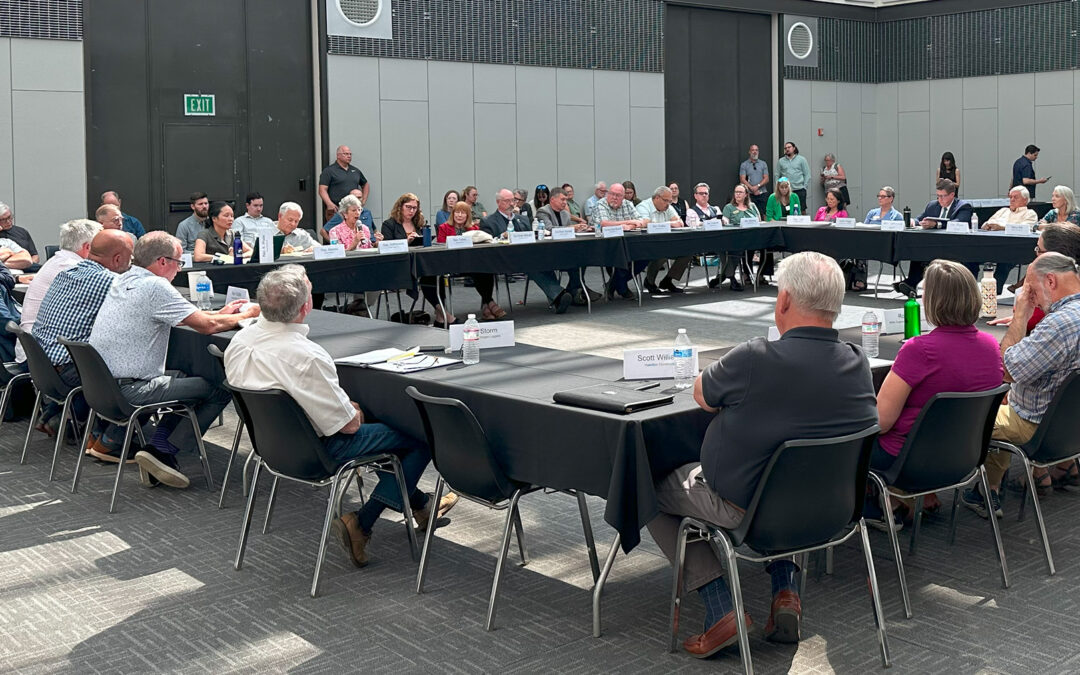
Aug 25, 2024 | Transportation
The Oregon Department of Transportation (ODOT) has extended the deadline for the Local Consultation Survey, a federal requirement which ODOT is required to conduct and report on every five years. The Association of Oregon Counties (AOC) encourages members to participate in the survey.
Click here to complete the survey by Sept. 27.
ODOT Local Consultation Survey FAQ:
What is the Local Consultation Survey?
The Local Consultation Survey (LCS) is a method we use to meet federal regulations requiring the state to gather feedback from nonmetropolitan local officials and other interested parties regarding the cooperative planning process and any proposed changes. The survey will evaluate ODOT’s local consultation practices regarding the following processes:
- Conferring with affected local officials and other interested parties in accordance with established rules, plans, policies, procedures, and programs.
- Considering the input of local officials and other interested parties before acting.
- Periodically informing local officials and other interested parties about actions taken.
- Implementing public involvement processes.
What are we asking?
We’re interested in your experiences with statewide transportation planning and programming activities. Transportation planning refers to participation in activities such as updating the Oregon Transportation Plan (OTP) or any of its component mode and topic plans, including the Transportation Safety Action Plan (TSAP) and the Oregon Public Transportation Plan (OPTP). The survey also includes questions about involvement in developing the Statewide Transportation Improvement Program (STIP), reflecting on the processes used to prioritize and program
Who are we asking?
We are sending the survey to all Area Commissions on Transportation, the League of Oregon Cities, the Association of Oregon Counties, and many of our committee partners. As part of this effort, we are also gathering feedback from metropolitan representatives and Tribal governments as members of an Area Commission on Transportation. This survey is not to be considered part of the conditions for metropolitan or Tribal consultation per federal requirements, but rather leverages this opportunity to gain additional feedback from these partners.
How are we using the results?
We use feedback to improve our outreach practices. ODOT is continually working to improve, and these results will assist the agency in enhancing how it communicates and engages with key partners. The data will affect policies regarding who, when, and how often to contact different parties in the planning process. The recently updated Oregon Transportation Plan drew guidance from LCS feedback when updating outreach guidelines and practices.
Want more information?
The survey has been extended until September 27, 2024. Please contact Rachel Zakem at Rachel.zakem@odot.oregon.gov for more details.

Jul 29, 2024 | AOC News, Transportation
County commissioners capitalized on opportunities to engage with the Oregon Legislature’s Joint Committee on Transportation (JCT) at the committee’s Transportation Safety and Sustainability Outreach Tour stops in Albany and Eugene in July.
Listening tour host counties Linn and Lane worked closely with the Oregon Department of Transportation (ODOT) to plan a local facility site tour to demonstrate cross-jurisdictional partnership and the essential nature of the shared county/state/city road system in supporting public services, jobs, and the economy of our state.
Following the site tours, county commissioners from the Albany and Eugene regions were invited to attend an intimate roundtable conversation with JCT members, local legislators, Oregon Transportation Commission members, governor’s office staff, ODOT leadership, and other community transportation leaders.
County commissioners discussed the impact of inflation, dwindling federal support, and limited local revenue bases on county road department budgets and stressed that counties put their 30% of the State Highway Fund to good use.
“The vast majority of Lane County’s road infrastructure was built over 100 years ago and, with escalating costs, we are falling further behind in our maintenance and preservation backlog,” said Lane County Chair Laurie Trieger. “Beyond the preservation needs of our existing century-old infrastructure,” she said, “we are also focused on key system pillars to carry us into the next century of service: safety, resilience, equity, and access.”
One of the Association of Oregon Counties’ (AOC) top legislative priorities for the 2025 session is to ensure a comprehensive transportation funding package prioritizes investments in operations, maintenance, and safety; incorporates diverse and modern funding mechanisms to ensure the growth and stabilization of the State Highway Fund; maintains the 30% county share of State Highway Fund revenues; and reduces barriers to local revenue sources.
The JCT listening tour continues throughout the summer, stopping next in Coos Bay on Aug. 7. Find the complete tour schedule and resources on the AOC website. AOC and the County Road Program are offering support via talking points, template testimony, and one-pagers to our member counties.
The AOC County Road Program conducted a statewide survey this spring and will present a comprehensive County Road Needs Study to the legislature during September Legislative Days in Salem.
Submitted by: Mallorie Roberts | Legislative Affairs Director

Mar 26, 2024 | AOC Advocacy, AOC News, Transportation
Until the passage of Senate Bill 1566 during the 2024 short session, Oregon law prohibited counties from charging fees for permits issued to water, gas, electric, and communications utilities for construction, repair, or maintenance work in the county right of way.
The statutory preemption on permit fees meant that precious State Highway Fund dollars intended for county road improvements and maintenance were instead subsidizing public and private utility operations. The Association of Oregon Counties (AOC) and the Oregon Association of County Engineers and Surveyors (OACES) have prioritized the lifting of this preemption through legislative action for several legislative sessions.
The concept was introduced as SB 635 in the 2023 session, and AOC participated in a months-long work group with utilities that was ultimately fruitless. Before the end of the 2023 session, AOC successfully advocated for an interim committee work group sanctioned by the Joint Committee on Transportation. That workgroup was led by committee co-chair Sen. Chris Gorsek and committee member Sen. Lynn Findley. Five county representatives participated in several meetings around the state during the interim and negotiated the language that became SB 1566, which was introduced as one of the Joint Committee on Transportation’s three short session bills. AOC and counties are grateful to staff and commissioners from Multnomah, Polk, Union, Jefferson, and Lincoln counties and the leadership and dedication from Sens. Gorsek and Findley, without whom SB 1566 would not have passed.
SB 1566 removes the preemption in ORS 758.010 and allows counties to charge cost-recovery fees for permits issued to the utilities that could previously operate in the county right of way free of charge. The language includes negotiated permit fee exemptions for vegetation management, routine maintenance, and emergencies. Completed fee-eligible permits must be approved or denied by the county within 15 days. SB 1566 sunsets in 2031, so the legislature will have to review and renew the authority it provides to counties in a future session.
SB 1566 is permissive — if a county wishes to pursue the fee structure the bill authorizes, it must pass an ordinance. SB 1566 contains language that allows a county to begin ordinance development immediately, and includes an emergency clause so it will be in effect upon the governor’s signature. AOC and OACES will create opportunities to collaborate on ordinance development and track the efficacy of this new authority over the next five years.
Contributed by: Legislative Affairs Director Mallorie Roberts

Jan 25, 2024 | AOC Advocacy, AOC News, Transportation
The Association of Oregon Counties (AOC) and League of Oregon Cities (LOC) continued the Transportation Funding Forum meeting series in January (watch recording), featuring presentations from Governor Kotek’s transportation policy staff and transportation stakeholders in the construction industry, the environmental community, transit, and freight carriers. The discussion explored the range of interests and priorities in the future of Oregon’s shared transportation system.
The forum series will continue through 2024 to further coordination, collaboration, and shared understanding of local government interests in the future of Oregon’s transportation funding system and increase transparent, partnership-oriented communication with state agencies, stakeholders, and the legislature. Upcoming forums will take deep dives into national trends in the future of transportation funding, explore local revenue options, more specific needs related to safety, bridges, and the multimodal system.
The kickoff forum meeting in August (watch recording) provided a detailed overview of federal, state, and local funding mechanisms and how these revenue tools work together to fund the current system. The October meeting (watch recording) featured presentations from city and county road departments to demonstrate the range of local jurisdiction transportation budgets and varied regional project priorities.
Contributed by: Mallorie Roberts | AOC legislative affairs director

Oct 24, 2023 | AOC Advocacy, Transportation
The Association of Oregon Counties (AOC) and League of Oregon Cities (LOC) continued the virtual forum series to coordinate, collaborate, and cultivate a shared understanding of local government interests in Oregon’s transportation funding system.
In August, the first forum meeting provided a detailed overview of federal, state, and local funding mechanisms and how these revenue tools work together to fund the current system. Presentations from the Oregon Department of Transportation, AOC County Road Program, and LOC reviewed the current system, with an emphasis on structural deficits and declining fuel tax revenues. A recording is available here.
The second forum meeting, held on Monday, Oct. 2, featured presentations from two city and two county road departments that demonstrated the range of local jurisdiction transportation budgets and varied regional project priorities. A productive brainstorm and strategy discussion followed the presentations. Slides are available here and a recording of the meeting can be found on the League of Oregon Cities YouTube page.
Forum meetings will continue next year to identify priorities and develop guiding principles to inform AOC and LOC engagement in an expected transportation funding package during the 2025 legislative session. Forum conversations will seek to increase transparent, partnership-oriented communication with state agencies, commissions, and the legislature related to transportation funding policy.
Future forum meetings will feature insight from national experts, and an exploration of mechanisms such as congestion pricing and tolling, road usage or vehicle miles traveled fees, and local options.
Contributed by: Mallorie Roberts | AOC Legislative Affairs Director

Apr 3, 2023 | Transportation
The Oregon Department of Transportation (ODOT) released the draft Oregon Transportation Plan (OTP) for public review and comment.
Tell ODOT what you think!
You are invited to review the draft OTP and provide comments now through May 12.
Why should you review and provide comments? Because this 25-year plan guides important transportation-related decisions that impact people like you and communities like yours every day. Your comments will let ODOT and the Oregon Transportation Commission know what you value in a transportation system – now and into the future.
Learn about the plan, how to provide comments, and get your questions answered at a live webinar on Tuesday, April 11 at noon. If you cannot make it to the live event, the recorded webinar will be posted on the project webpage following the meeting.
Ways to Comment
Visit the project webpage for more information.
About the Plan
The OTP sets the long-range transportation policy for Oregon transportation system. It informs investment decisions by ODOT and regional and local governments for all the ways we get around, including walking, rolling, biking, and taking public transit like buses and streetcars. Planning for a better transportation future is a complex challenge that takes collaboration, compromise, and creativity across the entire state and in our local communities.
Your participation is important! Your feedback will help finalize a plan that gives ODOT the opportunity to develop a more sustainable and equitable transportation system for all Oregonians.
Why is the plan being updated?
The OTP was last updated in 2006 and much has changed. Updating the OTP will help us develop a resilient plan that can adapt to drivers of change such as climate change, social equity, our growing population over age 65, and new technologies.
Contact
Questions and comments can be submitted at any time to the project team at:
Phone: 503-423-3720
Email: OTP@odot.state.or.us
Website: tinyurl.com/OTP-update
More information is available here.
Contributed by: Oregon Department of Transportation Project Team






